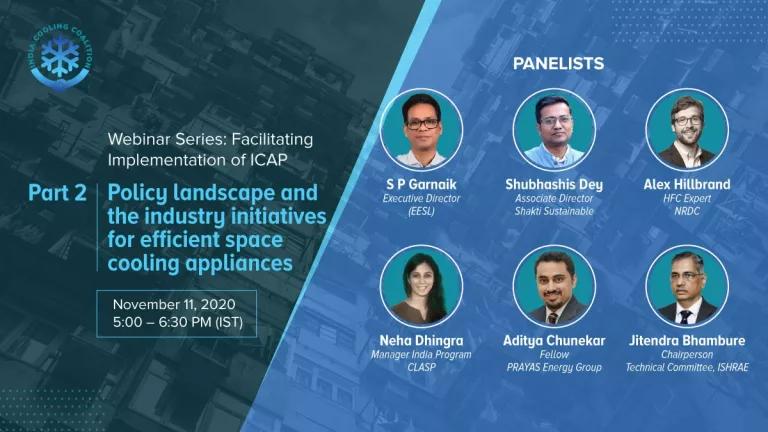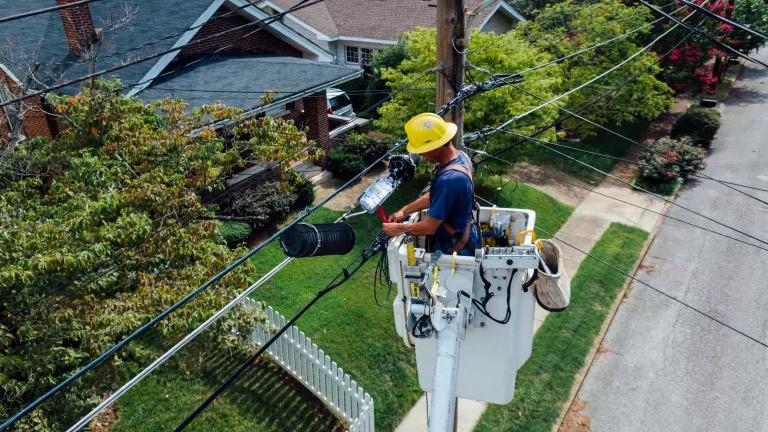Efficient Appliances Key to Sustainable Cooling in India
Given India’s goals to significantly reduce the energy required for cooling, effective implementation of policy mechanisms such as efficiency standards and labels is essential.

The world needs to install 10 air conditioners every second for the next 30 years to provide comfortable cooling for all and alleviate health risks from extreme heat. About a third of these are expected to be installed in India where currently less than 10% of homes have air conditioners. Given India’s goals under the India Cooling Action Plan to significantly reduce energy required for cooling, effective implementation of policy mechanisms such as efficiency standards and labels is essential.
To discuss the policy landscape and strategies to strengthen India’s appliance efficiency program, leading national and international experts gathered today at a virtual roundtable organized by the India Cooling Coalition, a multi-stakeholder group working to support implementation of the India Cooling Action Plan. NRDC is a part of the India Cooling Coalition and is actively engaged with cities, states and the national government in India on climate-friendly cooling.
Since its launch in 2006, India’s Star label program run by the Bureau of Energy Efficiency (BEE) has made a tremendous impact on national energy use, driving down the energy consumption of individual appliances and increasing consumer awareness about energy efficiency. However, a recent audit by Comptroller and Auditor General, an independent authority in India, found that many air conditioners and refrigerators sold in the Indian market do not actually perform as indicated by the efficiency label. The roundtable participants discussed ways to strengthen the standards and labeling program and implement market-based solutions to increase share of efficient appliances.
Key takeaways:
- Resources and capacity for testing: Alex Hillbrand, global cooling expert at NRDC, highlighted international best practices for effective implementation of appliance standards and energy labels and stressed that adequate appliance testing resources and industry cooperation are equally important to successfully achieve the objectives of the labeling program. Globally, several countries, such as the United States, require products to be tested by an independent third party before labeling.
- Increasing transparency: To increase consumer trust in the efficiency labels, panelists emphasized on the need for a publicly available rulemaking manual for selection, revision, and verification of appliance standards and labels as well as for a wider availability of data on check testing results.
- Localizing supply chains and policy certainty: Indian industry has made significant improvements in air conditioner efficiency over the years. Ensuring that cooling appliances are designed with a factor of safety to not fail check testing is in the interest of manufacturers several of which are large multinational corporations. Longer-term certainty on efficiency standards and a domestic supply chain can help manufacturers plan for introducing more efficient appliances without significant price increase. Panelists further noted that cost of low-GWP refrigerant is very less, about 2% of the total cost of the unit and this presents another opportunity to make air conditioners climate friendly.
- Consumer awareness: The discussion highlighted the importance of consumer awareness in driving up the market share for more efficient products. For example, consumer demand for more efficient variable speed air conditioners has helped increase their market share rapidly in the last few years. Communicating lifetime ownership cost of air conditioners is important to help consumers make an informed choice.
- Market-based solutions: Initiatives such as the bulk procurement program run by Energy Efficiency Services Limited (EESL), can play an important role in moving the market toward more efficient models by presenting efficiency as a source of competitive advantage. EESL has instituted several programs on sustainable cooling including collaborating with power distribution companies for driving down the cost of efficient appliances. EESL is also collaborating with NRDC and SEWA in taking clean energy solutions to villages in India as a part of our Green Villages initiative.
In a rapidly warming world, air conditioners are vital in providing much needed cooling while keeping greenhouse gas emissions and energy use to a minimum. At the same time, India recognizes the enormous opportunity in transitioning to high efficiency, climate friendly air conditioners. With major Indian cities suffering from severe air pollution, sustainable cooling is critical in not just protecting the environment but also the health and well-being of people. NRDC and partners stand committed to building resilience against extreme heat and supporting efforts to provide sustainable and affordable cooling to all.




